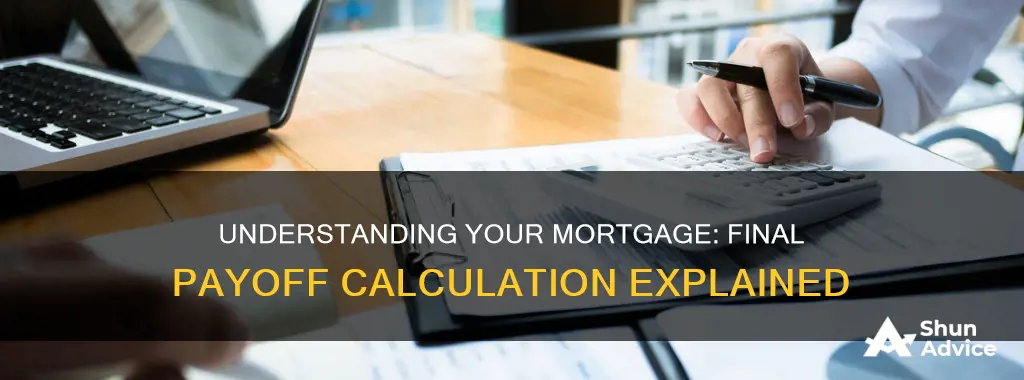
Paying off a mortgage is a common goal for many homeowners, but it can be a daunting task to calculate the final payoff amount. A mortgage payoff is the total amount that needs to be paid, including the principal and interest, before the mortgage is completely paid off. The principal is the amount borrowed, while the interest is the lender's charge for borrowing the money, typically represented as an annual percentage of the remaining loan balance. To calculate the final payoff, one must consider factors such as the type of loan, its terms, and the borrower's actions. Online mortgage payoff calculators can be useful in estimating the payoff amount, but it is always important to confirm with the lender to avoid unexpected fees or remaining balances. Understanding the calculations can help individuals make more informed financial decisions and plan for their future.
| Characteristics | Values |
|---|---|
| Definition | A mortgage payoff is the total amount that you will pay before your mortgage and all of the interest is completely paid off. |
| Purpose | To help evaluate the different mortgage payoff options, including making one-time or periodic extra payments, biweekly repayments, or paying off the mortgage in full. |
| Benefits | Paying off your mortgage can have a positive impact on your credit. It can also help you determine when you'll become mortgage-free and plan for your financial future. |
| Considerations | The exact amount you’ll need to ultimately pay off a mortgage changes based on the specific terms of your loan. There may be added fees for paying it off early. |
| Calculation | The standard formula is based on the principal, the interest rate, the number of payments made, and the number of payments remaining. |
| Online Calculators | Online mortgage payoff calculators are available to help evaluate how extra payments can save on interest and shorten mortgage terms. |
| Payoff Statement | A payoff statement is a document that details the exact amount of money needed to fully pay off your mortgage loan. |
What You'll Learn

Mortgage payoff calculators
These calculators can be used to determine how much money can be saved by increasing monthly payments, making one-time or periodic extra payments, or paying off the mortgage in full. They can also be used to compare different mortgage types and determine how much house one can afford.
For example, if a borrower has a remaining balance of $372,217.43 and decides to pay an extra $500 per month, they will pay off their mortgage in 17 years and 3 months instead of 24 years and 4 months, saving $122,306 in interest.
It is important to note that the exact amount needed to pay off a mortgage can change based on the specific terms of the loan. Thus, it is recommended to request a mortgage payoff statement or letter from the lender, which details the exact amount of money needed to fully pay off the loan. This document is essential when consolidating debt or changing the terms of a loan.
Alimony and Mortgage: Counting Alimony in Mortgage Applications
You may want to see also

Interest savings
Interest is the lender's charge for borrowing money. This interest charge is typically a percentage of the outstanding principal. The interest rate is usually represented as an annual percentage of the remaining loan balance. For example, a 4% interest rate on a $200,000 mortgage balance would add around $652 to your monthly payment.
The more frequent the payments, the less interest accrues since it brings down the principal balance faster. This means that paying bi-weekly instead of monthly will result in paying less interest overall. This is because, in a year, paying bi-weekly results in 26 total payments, which is equivalent to 13 full monthly payments, thus effectively making one extra payment.
Another way to save on interest is to make extra payments on the principal balance of the mortgage. This will help pay off the mortgage debt faster and save thousands of dollars in interest. However, it is important to note that some lenders may charge a fee for making extra payments, so it is important to check before committing to this plan.
Additionally, refinancing a mortgage can also help save on interest. This involves taking out a new loan to pay off the existing loan's outstanding balance, which can result in a lower monthly payment. Refinancing can also be an opportunity to change the terms of the loan or lock in a lower interest rate. However, refinancing requires hefty closing costs, so it is important to ensure that the savings justify the expense.
For those who are struggling with debt, a cash-out refinance can be a good option. This involves refinancing the mortgage and getting a cash payment for most of the equity in the home. The cash can then be used to pay off high-interest credit card debt, which will result in lower interest rates and more convenience, as there will only be one monthly payment.
Finally, for those who do not plan to live in their homes for more than five years, switching to an Adjustable-Rate Mortgage (ARM) can be a good option. ARMs offer a low rate for the first five years, after which the rate becomes variable and matches the prime rate. This can save homeowners hundreds of dollars per month on their mortgage payments. However, if the plan is to stay in the home for longer than five years, this strategy can be risky, as interest rates may increase.
Understanding Mortgage Payment Strategies and Management
You may want to see also

Early payoff
Paying off your mortgage early can be a great way to liberate your saving and spending capacity. However, there are important considerations to keep in mind. Firstly, you need to evaluate how much cash you need. Prepaying your mortgage means your money is tied up in home equity, resulting in less access to cash for other expenses and emergencies. Secondly, understand the tax consequences. If you are eligible for the mortgage interest tax deduction, you may lose this benefit by paying off your mortgage in advance. Therefore, it is important to weigh the potential long-term savings of making extra payments against the short-term need to save for other expenses.
If you decide to pay off your mortgage early, there are several strategies you can employ. One common approach is to make extra payments towards your principal balance. This can be done by increasing your monthly payments, making lump-sum payments, or scheduling recurring extra payments. By reducing the principal, you will also reduce the interest charges, saving you money. Another strategy is to make bi-weekly payments, which involves dividing your monthly payment in half and paying that amount every two weeks. This results in 26 half-payments per year, effectively making one extra monthly payment.
Additionally, you can consider mortgage refinancing to shorten your term and obtain lower interest rates. For example, if you have a 30-year mortgage, you may be able to refinance to a 15-year mortgage with reduced interest. Refinancing also allows you to switch between a fixed-rate mortgage and an adjustable-rate mortgage, depending on your needs. However, it is important to note that refinancing should be done early in the loan term to maximize the benefits.
Before making extra payments, it is crucial to check with your lender for any prepayment penalties. Some lenders may charge a fee if you pay off your mortgage early or make a significant reduction in your principal balance. Understanding the terms and conditions of your mortgage will help you avoid unnecessary penalties.
Renters: How to Handle Mortgage Applications
You may want to see also

Retirement planning
Understanding Mortgage Payoff Calculations:
The final mortgage payoff calculation involves more than just the principal amount you borrowed. It includes interest charges, which are the lender's fees for borrowing the money. Interest is typically calculated as a percentage of the outstanding principal balance. To estimate your total mortgage payoff, you can utilize a mortgage payoff calculator, which accounts for the remaining loan term, interest rate, and monthly payments. These calculators can help you determine how long it will take to become mortgage-free and plan your financial future accordingly.
Strategies to Pay Off Your Mortgage Before Retirement:
- Extra Payments: Making additional payments towards the principal balance of your mortgage can help you save on interest and shorten the loan term. This strategy can result in significant savings over the life of the loan.
- Increased Monthly Payments: Increasing your monthly payments can also lead to an early payoff. However, ensure that this aligns with your financial capabilities and doesn't deplete your cash reserves needed for emergencies.
- Bi-Weekly Payments: Instead of making monthly payments, you can opt for bi-weekly payments. This strategy can help you pay off your mortgage faster by making the equivalent of one extra monthly payment per year.
- Refinancing: Refinancing your mortgage can be a viable option to reduce interest rates and lower your monthly payments. However, be cautious of prepayment penalties and closing costs associated with refinancing.
- Investing Elsewhere: Consider the opportunity cost of paying off your mortgage early. The money used for early payoff could potentially be invested elsewhere with higher returns, especially in a low-interest-rate environment.
- Retirement Savings: Prioritize building a solid nest egg for retirement. Investing for retirement should come first, allowing your investments to grow over time through compound interest. Utilize retirement planning calculators to assess if you are on track with your retirement savings goals.
- Emergency Savings: In addition to retirement savings, ensure you have a robust emergency fund to handle unforeseen expenses during retirement.
- Tax Implications: Paying off your mortgage early eliminates the tax benefits associated with mortgage interest deductions. Consider the potential tax implications and assess if you can take advantage of other tax-advantaged accounts, such as an IRA, Roth IRA, or 401(k).
- Financial Wellbeing: Always evaluate your overall financial landscape before making decisions. Ensure that paying off your mortgage early does not compromise your financial wellbeing and ability to handle other financial goals, such as saving for your children's education.
Understanding Conversion Mortgage Repayment: What You Need to Know
You may want to see also

Principal payments
The principal is the amount borrowed to finance a home purchase. Each month, part of the monthly payment goes towards paying off the principal, and part pays interest on the loan. The interest is calculated as a percentage of the outstanding principal.
At the beginning of a mortgage term, the loan balance is high, so most of the monthly payment is applied to the interest, with the remainder going towards paying off the principal. Over time, as the principal balance is paid down through monthly or additional payments, the amount of interest decreases, and more of the monthly payment goes towards paying down the principal. This process is known as amortization.
Making additional principal-only payments on a home loan can help to reduce the amount of interest paid over the life of the loan and shorten the loan term. However, it's important to check with the lender to ensure that they allow extra payments and that these will be credited towards the principal. Some lenders may charge a fee for extra payments or a prepayment penalty for paying off the loan early.
There are several approaches to making additional principal payments. One option is to make frequent payments, while another is to save up and make one large annual payment. It's also possible to pay more on each monthly instalment or make a one-time payment.
Amerisave Mortgage: A Comprehensive Review of Their Services
You may want to see also
Frequently asked questions
A mortgage payoff statement, also known as a payoff letter or quote, is a document that details the exact amount of money that is needed to fully pay off your mortgage loan. It is a vital document to have on hand as the interest on your loan balance is added daily.
The formula for calculating your mortgage payoff amount is based on the principal, the interest rate, the number of payments made, and the number of payments remaining. You can calculate this manually or use an online mortgage payoff calculator.
Calculating your mortgage payoff amount can help you determine when you'll become mortgage-free and plan for your financial future. It can also help you assess the impact of making extra payments or refinancing your mortgage.







